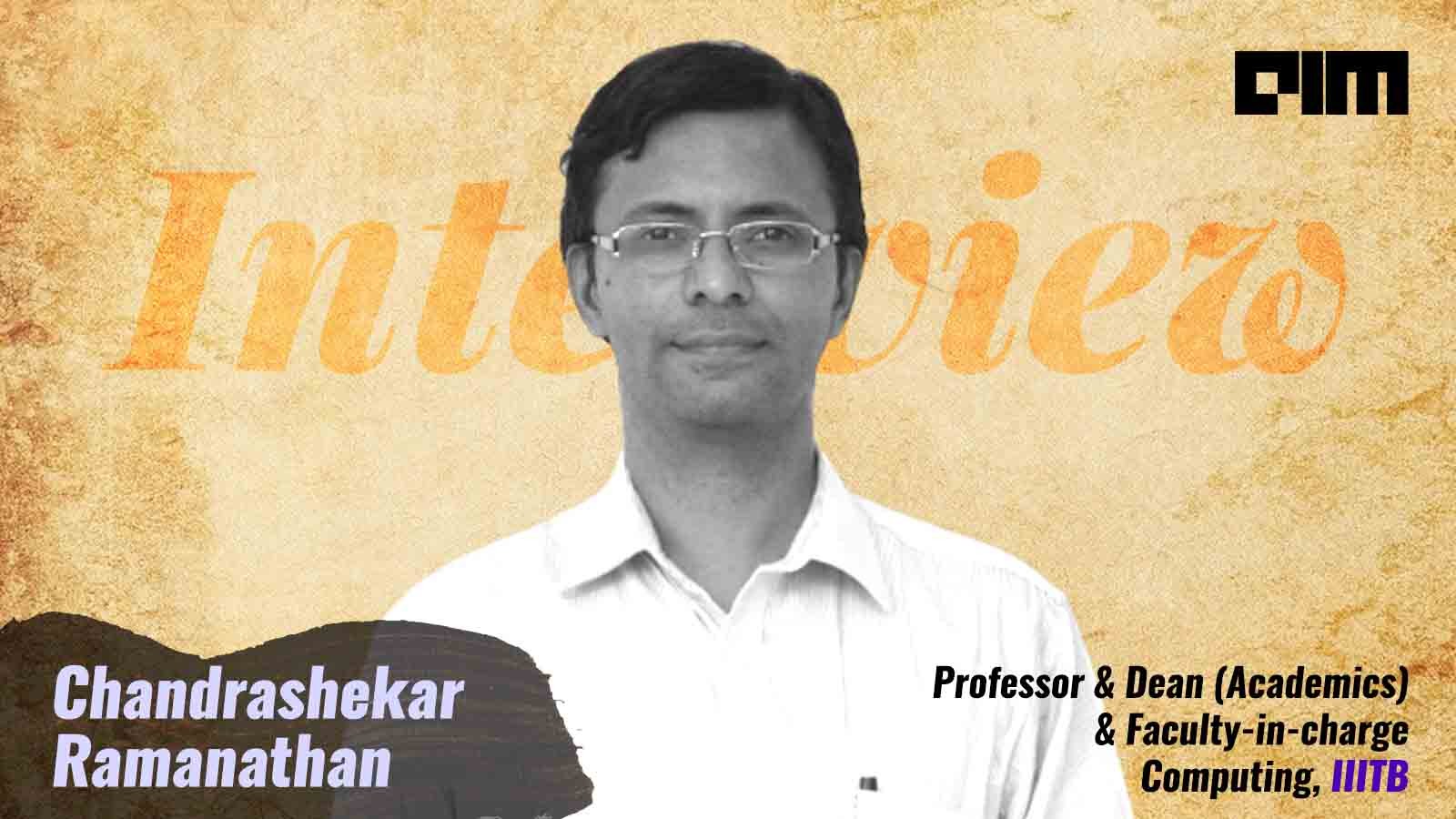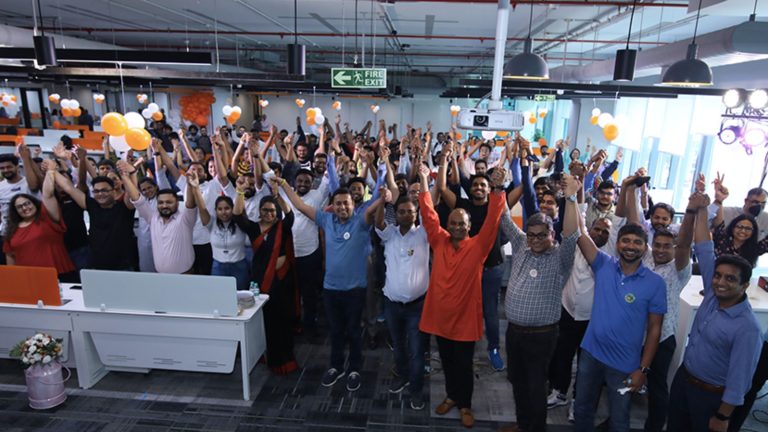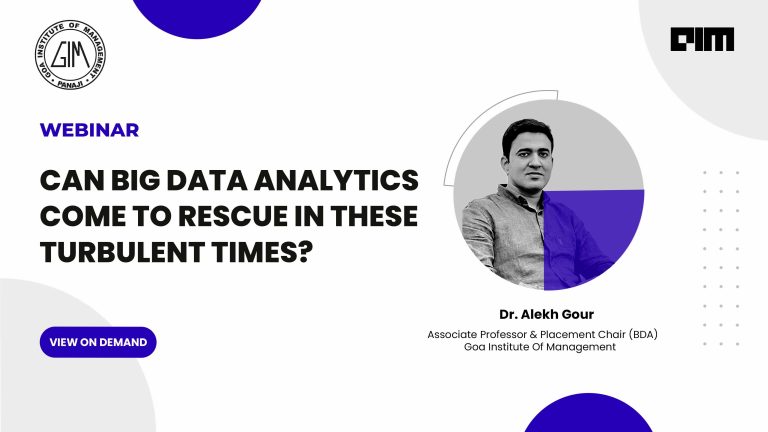For the sixth interview in the weekly series of data science career, we got in touch with Professor Chandrashekar Ramanathan, the Professor & Dean (Academics) & the Faculty-in-charge of Computing at IIITB.
While the data science education market has soared over the last few years, professor Ramanathan believes content and structure of University courses should address the changing landscape and industry requirements.
Professor Ramanathan is a faculty member at IIITB whose primary focus areas include, data science, software engineering, information convergence, semi-structured databases, and application development. With over ten years of experience in large multinational organisations, he has co-authored several research papers on edge intelligence for industrial IoT, HDSanalytics, OAES, machine-readable ontology for teaching etc.
In this interview, he shared insights into the data science education market and how universities can create a relevant industry-ready data science course.
Excerpts
AIM: Is India an important market for data science education? What’s IIITB’s contributions to this highly promising sector?
Professor Ramanathan: The Indian data science market is in its growth phase, and the Indian education market is working towards meeting the potential opportunities and job options in the country. That being said, we have some strides to make to fulfil the promised numbers. The world is always looking up to India for IT solutions, and I believe this trend will not change in the near future. This outlines the immense scope for growth as far as India’s data science education market is concerned.
IIITB realised the potential for offering online programmes early on. In 2016, we started offering online courses on Data Science. We also offered a Data Analytics programme titled ‘The Analytics Essentials’. This course started with a small batch of 30 students, and subsequently, we partnered with Upgrad to increase the program’s reach. Here we offered two variations of this programme – Post Graduate Diploma in Data Science, intended for professionals new to this field, and Post Graduate Diploma in Machine Learning & AI, an advanced course designed for professionals working in analytics and related areas. This program is conducted online and does not compromise on academic rigour. Key elements like regular lectures, assignments, lab activities, projects, etc., offered here match the stature of those provided in all our on-campus programs.
AIM: What sort of challenges a university faces while instrumenting a data science and analytics course?
Professor Ramanathan: ‘Relevance’ is a challenge that universities and institutions face on a real-time basis. Industry demands and requirements are constantly changing, and it is crucial to make sure the course content and structure address the changing professional environment. It becomes even more important since most data science students are professionals with relevant industry experience. Therefore, when teaching working professionals, we have to be cognizant of their work timing and ensure the content is compact and easily comprehensible.
AIM: What was the impact of the COVID pandemic on the data science education market? How can governments nudge more students to data science?
Professor Ramanathan: The pandemic and the work-from-home setting have provided the bandwidth and opportunity for professionals to pursue online courses. Of course, with several data science courses and opportunities available in the market, it may almost appear like the professional is being compelled to take the course. But I feel the situation has simply allowed more time and clarity to choose to upskill.
In terms of government — policies like NEP are instilling significant realisation that we need to encourage multidisciplinary environments. However, to address modern-day problems, we need a well-thought combination of STEM and other disciplines. It will contextualise problems and solutions and help our students stand out.
AIM: What are the major obstacles data and analytics education faces in India?
Professor Ramanathan: One of the initial obstacles was the availability of data and data-enabled systems. Analytics cannot function without data. IT enablement over the years is helping overcome that particular challenge. Now, we have a continuously updating repository that can be easily used for education.
AIM: What’s your advice for aspiring data scientists? What does the future look like for someone who pursues data science now?
Professor Ramanathan: Technological expertise augmented by strong domain knowledge is important for an aspiring data scientist. One should have a clear understanding of the rules and practices of the industry before applying technological aspects to it. Be it automotive, BFSI, manufacturing or ecommerce, you can be a good data scientist in the field if you couple domain-specific knowledge with technical competence.
Ideal candidates would have a degree or background knowledge of computer science or information technology. Data science is vast and may not suit everyone. Therefore, it is vital to have an aptitude to understand the data, see patterns, analyse from different perspectives and present findings to suit the end-user while also being open to understanding the domain.
AIM: What’s your projections for AI and BDA education?
Professor Ramanathan: AI and Big Data Analytics (BDA) education will be almost second nature to at least the computer science professionals. In the next five years, they will be required to have basic knowledge and awareness of the subject. This multiplied by the number of graduates we produce each year will probably be the size of the market.
AIM: How does an industry partnership add value to the university courses?
Professor Ramanathan: Industry partnerships are crucial to educational institutions. The two key components of a data science course are the fundamental conceptual foundation laid by highly qualified academicians and industry stalwarts with on-ground expertise and visibility. Both ensure that the key takeaways are beyond theoretical knowledge and include practical insights and understanding.
AIM: Do you think a professional degree will have an edge over numerous online courses and MOOCs available for data science enthusiasts?
Professor Ramanathan: We see several students approach us with this question. We always illustrate to our students that if their primary motive is to learn, it does not matter what course format is being pursued. In such a scenario, the individual is left with the burden of finding the correct course with sufficient content and information. On the other hand, a professional degree programme is backed by a trusted institution and brings content curated to suit industry requirements and ensures professional partnerships to benefit students.



















































































